
Professor, culture critic, and social justice advocate Cornel West joins us in our studio to talk about the presidential race, the war in Iraq, the religious right, social change and much more. Author of numerous books on philosophy, race and sociology, West’s latest book is Democracy Matters: Winning the Fight Against Imperialism. [includes rush transcript]
The Republican National Convention in New York last week was marked by historic protests and acts of dissent on the streets. Last Sunday, hundreds of thousands of protesters marched in the largest demonstration ever at a political convention. Over the course of the week, thousands of people took to the streets, staging hundreds of rallies, direct actions and civil disobedience against the Bush administration. Though the protests were generally calm, arrests exceeded 1,700 for the week, a record for a political convention.
President Bush wrapped up the convention on Thursday, kicking off a two-month race to the Nov. 2 election against Democratic challenger John Kerry. Over the weekend, new polls by Newsweek and Time showed that Kerry is floundering with President Bush ahead with a double-digit lead. Throughout the convention, Kerry was portrayed as indecisive and chants of “Flip-flop” echoed in Madison Square Garden. With Ground Zero just three miles away, the memory of September 11 was evoked by nearly every major speaker at the convention.
Today to talk about politics, race and the election we are joined by professor, culture critic, and social justice advocate Cornel West. He has been described as one of America’s most vital and eloquent public intellectuals. A professor of religion and African-American studies at Princeton University, West is a critic of culture, an advocate of social justice and an analyst of post-modern art and philosophy. He has written and co-authored numerous books on philosophy, race and sociology. His latest work is “Democracy Matters: Winning the Fight Against Imperialism.”
- Cornel West, professor of religion and African-American studies at Princeton University, West is a critic of culture, an advocate of social justice and an analyst of post-modern art and philosophy. He has written and co-authored numerous books on philosophy, race and sociology. His new book is Democracy Matters: Winning the Fight Against Imperialism.
Transcript
AMY GOODMAN: Well, today, we’re going to talk about politics, about race, about the election with Professor Cornel West. He has been described as one of America’s most vital and eloquent public intellectuals; he is a professor of religion and African-American studies at Princeton University. He has written and co-authored numerous books on philosophy, race and sociology. His latest book is Democracy Matters: Winning the Fight Against Imperialism. Welcome to Democracy Now!
CORNEL WEST: I am very blessed to be here. I want to congratulate you on this dynamite show and your book, Exception to the Rulers.
AMY GOODMAN: Thank you very much. And thank you for making this your first stop on your tour. Tonight you will be in Harlem and then you’re headed to Brooklyn and then Cooper Union as well?
CORNEL WEST: Cooper Union on Thursday.
AMY GOODMAN: So, you can check out our website. We’ll link to professor Cornel West’s schedule. But, what about your reaction to the two conventions, and the message that has come out of this? I last saw you at the Democratic National Convention, not inside, but outside when you were giving an address to the Tikkun community.
CORNEL WEST: Well, I’m very glad that you reported on the massive resistance because I’m deeply inspired by courageous people’s thirst for justice. I think it’s as important to stay in contact with what happens outside the conventions as inside. Both conventions are basically infomercials for a message that’s already prepackaged for candidates who are for sale. The real question is going to be how do we keep track of the raw stuff for a democratic awakening, given the pervasive sleepwalking that’s now taking place in the country. I think one sees signs of that democratic awakening when you see fellow citizens ready to put their bodies on the line, as it were, and let fellow citizens know and let the world know that people are concerned about deeper issues of justice as opposed to the superficial discourses that we saw in both conventions, actually.
AMY GOODMAN: At the mass protests here in New York, last Sunday, maybe half a million people marched for four-and-a-half hours; there was a fierce anti-war message, but I wouldn’t say that I saw many John Kerry signs.
CORNEL WEST: Absolutely no. First, it was a multiracial group. This is very important because the democratic awakening that needs to take place has to be one that brings together persons from a variety of different communities, concerned with a variety of different issues: dogmas of market fundamentalism, dogmas of aggressive militarism, dogmas of escalating authoritarianism, dogmas of white supremacy, of male supremacy, trade union movements. There has to be a coalescing of these various groups. That was one of the more encouraging things about the half million fellow citizens who brought their bodies to bare and were willing to protest and put forward their vision.
AMY GOODMAN: But what about this issue that perhaps the message was as strong for John Kerry, that this is what is mobilizing people, as for President Bush?
CORNEL WEST: Well, one hopes that that’s the case. I mean, I happen to support the anti-Bush united front because I think he’s so dangerous. I think we’re really on the verge of a very substantive authoritarianism if he wins. It’s just that Kerry, so far, has been so milquetoast and mediocre. But perhaps he can bounce back. One wonders whether one needs to talk to his handlers as opposed to talking to him. Because we’re in a situation now where these candidates really for the most part are instruments of their handlers. One has to keep track of who is handling him at the moment. Right now, it looks as if we’re in a shift, right? You have one side, the Ex-Clinton people now moving in, and who knows who is going to be handling him, but he’s got to come to life? There’s no doubt about it. I mean, there’s no doubt in my mind that there has to be truth-tellers like Ralph Nader just to let us know the levels of corruption, the degree to which both parties are parasitic on corporate interests and so forth. But as much as I respect and love brother Ralph.
AMY GOODMAN: And supported him.
CORNEL WEST: And supported him very vigorously and enthusiastically in 2000. I will pray for him this time and vote for Kerry only because I think Bush is that dangerous. But at the same time, how can one vote for Kerry if he’s so milk toast at the moment? Well, see, this is what I’m struggling with right now, as much as I really believe that we have got to make sure that Bush is not in the White House in January.
AMY GOODMAN: Well, what about Kerry’s message, saying, if I knew then what I knew now, yes, I would still do the same thing? Feeling probably quite a backlash from that. Not only from his own supporters, who might have been shocked, but also George Bush being able to use that, saying here he has criticized me, yet he says he would have done the same thing. Of course, it wouldn’t have been exactly the same thing, but that’s what he says.
CORNEL WEST: Well, I think we’re in a situation now where in the American Empire, we have got two candidates who have histories of being quite supportive of invasions. Kerry supported the invasion of Grenada. He supported the invasion of Panama and even brags about it. That’s why I feel so tortured to have to support somebody who I have such deep profound disagreements with, but it’s much more an anti-Bush vote than it is a pro-Kerry vote. But I think that Kerry has to either be honest and say that he is as pro-imperialist as Bush is — he’s just better on domestic issues — or he has to undergo a change and conversion and say, I was actually wrong, that I was duped. I was misled. I have changed my mind. Now, does he have the capacity to do that? I doubt it. Does any American politician have the capacity to do that? It’s hard to say; probably brother Paul Wellstone, who we deeply miss, would be willing to do something like that, or Bill Bradley, someone with some integrity, whether one agrees with them or not; but we’ll have to see. There’s no doubt that Kerry is in deep trouble and he needs a bounce-back.
AMY GOODMAN: Cornel West, you talk about the authoritarianism that you see. What do you mean by that? With President Bush.
CORNEL WEST: Well, we can begin with brother Tariq Ramadan at the University of Notre Dame. The story, of course, was he’s already been okayed to teach Islamic studies at one of the finest institutions of higher learning in our country. The U.S. government denies him a visa three days before he is to come. He’s already got his children enrolled in school. He’s got his courses in the curriculum. The University of Notre Dame is ready to embrace him as an interlocutor, not to endorse any views that he has. And he happens to be someone critical of U.S. foreign policy when it comes to the Middle East, the Israeli-Palestinian situation. They deny his visa. He’s now still stuck in Switzerland. Now, that’s just one peak of the iceberg in terms of the encroaching, creeping authoritarianism, in this case in universities, and the possibilities of the new McCarthyism. And of course, the USA PATRIOT Act would be the most concrete example of it, in which it is very clear that the government is expanding its powers of surveillance, its ability to intervene in the lives of citizens for its own ends, as it were, its definition of fighting terrorism.
AMY GOODMAN: We’re talking to Professor Cornel West. His book is Democracy Matters: Winning the Fight Against Imperialism. We’ll be back with him in a minute.
AMY GOODMAN: “The Journey, Sketches of my Culture.” That’s Cornel West and Derek 'D.O.A.' Allen. I’m Amy Goodman. This is Democracy Now! Democracynow.org. Actually, talk about this CD that we’re listening to right now.
CORNEL WEST: Yeah. That CD is from 2001. We have got a double CD that’s going to drop in a day or two called “Street Knowledge, 2004.” But that was a CD we put together back in my home, Sacramento, California, in the black neighborhood, Glen Alda, with Derek 'D.O.A.' Allen, Mike Dailey and my blood brother Clifton West. And it’s attempt to present a danceable education to a younger generation in which music such as hip hop is still central, fundamental way of holding pain at arm’s length and expressing creativity but try to remind them that this music is rooted in a struggle for freedom. It’s rooted in the attempt of a dehumanized people to express their human value, and to attempt to insure that even though they seemingly at moment were not free, that their music could constitute a foretaste of the freedom they were willing to live and die for. So it’s the sense that keeps alive the legacy of the Last Poets and Gil Scott-Heron, Curtis Mayfield and some of the great — Max Roach and Abbey Lincoln and so forth, the great musicians who connected their art to the struggle for freedom.
AMY GOODMAN: When we last spoke, we were talking about the rumor that this had something to do with why you left Harvard University after your infamous meeting with the president, Lawrence Summers, who used to be the treasury secretary with the World Bank, not happy with a Harvard professor doing hip hop CDs.
CORNEL WEST: Oh, yes, not a rumor at all. I think it’s true. He had a number of charges against me, but one was that having any involvement with hip hop, let alone producing a CD, was an embarrassment to the institution based on his definition of what the institution ought to do. And of course, my view is that his orientation is not my point of reference, that I’m trying to awaken the sleep-walking democratic fellow citizens across the board, be they old, middle aged or young. You speak their idioms and speak their language. You bring the Socratic energy and the critical orientation to what you are doing, but you speak their language and respect them enough to acknowledge that you need to be able to relate to them in their own way. That was one reason among others that we had the big clash, and I ended up at Princeton in New Jersey.
AMY GOODMAN: How do you feel about having left there?
CORNEL WEST: Oh, it’s magnificent. Shirley Tilghman, the president of Princeton, is just a visionary leader. There’s no doubt about that. I’m very blessed to be at Princeton. Don’t get me wrong, Harvard still has some magnificent people. It’s a grand tradition, they just have a problematic president, that’s all.
AMY GOODMAN: I wondered if it had anything to do with your politics at the time. I mean, here was Larry Summers, who was very much a Clinton man. You had supported Ralph Nader, talking about radical democracy.
CORNEL WEST: Well, I think that it was — it began with Bradley, because of course, Bradley and Gore had clashed. Gore had really mistreated Bradley. That story is yet to be told, just how ugly the treatment was.
AMY GOODMAN: This is when Bill Bradley, the New Jersey senator was running for president in 2000?
CORNEL WEST: Precisely. Then the move to Nader.
AMY GOODMAN: What happened between Bradley and Gore?
CORNEL WEST: Oh, it was just the lies and the vicious attacks, and so forth on Bradley. I mean, we tend to forget these things. People say politics is politics. Well, I believe that you ought to be able to criticize and engage in interrogation and scrutiny, but it ought not to ad hominem, especially in relation to people’s parents and so forth, and Bradley is a very close friend of mine, a brother of mine. And so there are certain things that were said we’ll never forget. People in wheelchairs, Bradley’s father, of course, grew up in wheelchair. There was a wheelchair in the commercial was denigrating in some vicious ways. I’ll never forget those kind of things. But it was my support of Bradley and the Clintonites going to Gore, then my support of Nader, and then probably even worse in the eyes of president Lawrence Summers was my support of brother Al Sharpton. I think in some ways that was one of the tipping points, that when I appeared with brother Al Sharpton at the National Press Club, saying that I was going to be a member of and even head of the exploratory committee, and he said, how can you support a candidate that other people are embarrassed by and no one respects. I said, it depends who your friends are. I happen to have great respect for Al Sharpton. I think he’s not perfect. He has done things that I’m highly critical of, but I think he’s a courageous fighter against police brutality. He’s a truth-teller when it comes to homophobia, corporate domination, and a host of other things. And so that was another point of contention, let’s put it that way.
AMY GOODMAN: We’re talking to Princeton University Professor Cornel West. He has written a new book. It’s called Democracy Matters: Winning the Fight Against Imperialism. You talk about the long list of imperial corruptions. What do you mean by that?
CORNEL WEST: What I mean by that is that we’re at a point now where the system is so corrupt, it has become normalized, and when we reached a moment in which might is conceived to define right. It’s like Thrasymachus in Plato’s Republic, where you make a mockery of truth and integrity and moral consistency, and it’s fundamentally about raw power, unregulated coercion. By hook or crook, you are going to impose a certain vision or set of policies that’s fundamentally about power. Then democracy in terms of its questioning function, democracy in terms of its concern with working people and poor people, democracy in terms of sustaining some hope as opposed to allowing a cynicism and apathy to become rampant, is called into question. I think we’re at a crossroads right now in terms of the imperial America devouring American democracy. We can talk not just about policies, but we’re talking much more broadly about certain patterns of behavior and perception. And I think this is resulting in, of course, unbelievable levels and very sad levels of disaffection, disillusionment, disengagement with the system. The vast majority of Americans don’t vote at all, in part because they see the thick levels of corruption. Those of us who are trying to convince them to vote and become participants, we have to be honest with them. These people are not stupid. The corruption that they see is very real. They may be short-sighted, myopic, because it’s going to make a difference who is the head of state, Bush, Kerry — I wish Nader, but he’s not going to win, therefore we have to wrestle with these very limited possibilities. But I think that more than anything else, we need some serious, courageous truth-telling, and witness-bearing. And that’s what encouraged me and inspired me regarding the mass protests that you started the show with.
AMY GOODMAN: What is your assessment of Iraq right now? Last 24 hours, perhaps the bloodiest for U.S. military since the beginning.
CORNEL WEST: Well, one, I think we need to acknowledge the degree to which this was a imperial invasion on behalf of new imperialists in Washington, who had it on the papers and planned prior to 9/11. The 9/11 became an occasion upon which to launch this imperial vision of the United States dominating the world, in part for the oil, but also for image that we are the colossus. We are the leviathan. And like most colossuses and leviathans in human history, they want to shape the world in its own interests and image. And that’s precisely what Kristol and Fife and the others had in mind in terms of their own imperial vision of the United States. I’m quite explicit and open about it. So we have to say, it was wrong. Look at the mess we’re getting into. You see? And who is bearing the cost? Disproportionately working class women and men, sisters and brothers of all colors. I think that brother Michael Moore, who was such a good citizen in terms of his willingness to tell the truth, to see how many young people or how many daughters and sons of the Congress are in the army. Was it one out of 435. When I go to black churches, I raise the question, how many have relatives in the army? 80%. 80%. Fighting disproportionately working class, brown, black. Those truths need to be told and then subsequent policy has to be some kind of withdrawals, significant withdrawal, and allow for transitional, put U.N. troops or some international force so that the brothers and sisters in Iraq, who are bearing so much of the cost — they have already bore the cost under the gangster, Saddam Hussein, installed by the C.I.A., supported by the United States, Donald Rumsfeld shakes his hand in 1983 and doesn’t say a mumbling word about the suffering of Iraqi people under Reagan. Now all of a sudden, those people are so concerned about the Iraqi people? No, that doesn’t follow. It doesn’t follow. Well, the American people need to know this, you see? And so part of it is expanding conversation, and part of it is a change in policy. Sorry to go on so long.
AMY GOODMAN: You write — please do, Professor West — you write about the forging of new Jewish and Islamic democratic identities. Can you elaborate on that?
CORNEL WEST: Well, I think it’s very important because you really cannot talk about Islamic terrorism, you cannot talk about instability in the Middle East, without talking about the Israeli-Palestinian issue. When you talk about democracy matters, beginning in the United States, you have to also talk about democratic identities that need to be forged more deeply in the Jewish world, for example, among American Jews. Where is the robust uninhibited debate about Israeli-Palestinian issues? We talk about Tikkun community, we talk about American Jews for peace in America. We talk about the efforts in the past to expand the debate so that the connection between security for Israel and justice for the Palestinians goes hand in hand rather than the very uneven and unfair and biased policy right now of the United States that acts as if a Palestinian life has less value than an Israeli life. Let’s have the debate about that. Very difficult to pull that off, given A.P.A.C., given various other lobbying groups in D.C. Let’s have a debate about that. And the same is true in the Islamic world. I don’t care. You’ve got gangsters who attack us. You got autocratic states. You got ugly forms of anti-Semitism within the autocratic states, but they also have oil. And how do you talk about democratizing in the Islamic world, what I call even socratizing Islam? I think Islam has tremendous prophetic possibilities, as does Judaism, as does Christianity. But the prophetic elements of Islam are suppressed, especially under clerical Islam. I got the chapter on both democratic possibilities in the Jewish world, which is a fusing of the security for Israel and justice for Palestinians, which is an end to the occupation. That’s the first and most important step, you see. Right now Sharon is doing what? Tightening the occupation with a symbolic pullout of Gaza, but a tightening of the occupation in the West Bank. We have to end the occupation, but there has to be democratic possibilities, democratic movements and democratic debates in the Jewish world and similarly so in Islamic world. I try to highlight some of the towering Islamic intellectuals who are very critical of all forms of authoritarianism in the Islamic world, but in the name of prophetic Islam, call for democracy. That’s, I think, one of the signs of hope.
AMY GOODMAN: You also write, Professor West, about the crisis of Christian identity in America.
CORNEL WEST: Absolutely, because you see, I think we have to recognize 80% of Americans are Christian, 96% believe in God. 72% believe Jesus Christ is the son of God. 49% say they spoke with God at least three times on intimate terms in the last four days. These are fellow citizens. Which means what? Which means that the battle for the soul of American democracy is in part a battle for the soul of American Christianity. Therefore, the call for prophetic Christians as opposed to Constantinian Christians, by Constantinian Christians, of course, I mean those who defer to the empire, very much like Constantine who was converted in 312, decriminalized Christianity in 313, and Christianity became the official religion of the Roman Empire under Theodotius the First, his successor. And of course, this is the same Roman Empire that put Jesus to death. So one of the real ironies is here you have the cross, the bloody cross which is the symbol of the night side of the Roman Empire. That’s where political prisoners were murdered, right? That same empire makes the movement that comes out of the death of Christ, which is Christianity, the official religion. So, you get diffusion of this religion with the state and what we have today in the Christian right are Constantinian Christians. They are imperial Christians. They have lost the prophetic fervor of the very Jesus Christ that they proclaim as their savior. In fact, they’re willing to sell their souls for a mess of imperial pottage in the name of the very Jesus who was put to death by the Roman Empire, the empire of its day. So, I’m calling for prophetic Christians, like James Forbes and Jim Wallace and Sujay Johnson Cook and others to be more visible, and I tell a story about how in fact the corporate America has manipulated Constantinian Christians to insure that prophetic Christians do not surface with power. So that our William Sloan Coffins and Dorothy Days and Daniel Berrigans, that rich history and legacy is more and more lost, and I’m calling for it.
AMY GOODMAN: Now we just have about a minute to go. President Bush very much appealing to evangelicals, millions who did not vote, many on the floor of the convention as I went around, wearing the faith voter button. The significance of this.
CORNEL WEST: They recognize that right now never in the history of America has organized Christianity had such power and clout, and especially an organized Christianity, which is in the back pocket of corporate America. So, we’re seeing explicit appeals as well as manipulation and a lot of times these Christians are very sincere. They’re just very, very short on history, and very little sense of the way in which they’re being manipulated, especially around issues of gay marriage, appeals to the homophobia, as well as issues of abortion. Very dangerous, but prophetic Christianity, must be reinvigorated if in fact democracy is actually to expand on the ground.
AMY GOODMAN: Cornel West, I want to thank you very much for being with us. Professor of Princeton University, theology and African American studies. Cornel West has a new book out, it is called, Democracy Matters: Winning the Fight Against Imperialism. Thanks for joining us.
CORNEL WEST: Thank you so very much. Good luck in the work you do here. You are a leaven in the loaf when it comes to the cowardly actions of so many of the journalists in the world. Thank God we got Amy Goodman, thank God we got Democracy Now!
AMY GOODMAN: Thank you, Cornel West, tonight in Harlem, tomorrow at Cooper Union and Brooklyn.

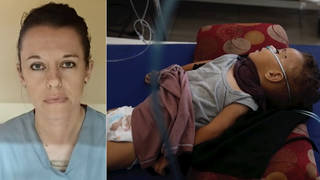
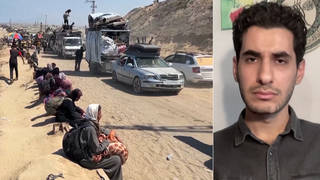
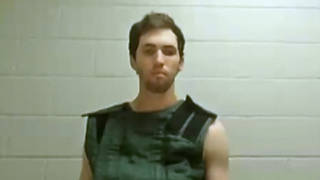
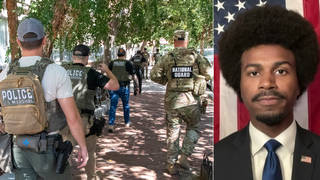





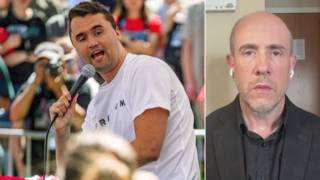
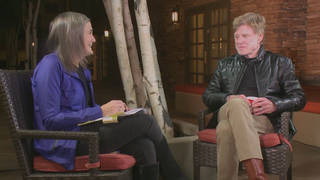
Media Options